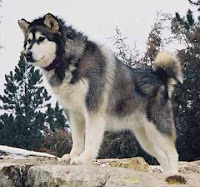Okay, so now we got that out of the way, and I can start talking about what neoteny is and also give you some examples. And what it is is when an adult of a species still has some juvenile traits, even after being all grown up. So in other words, it's an adult that still looks like a baby.
In humans, some examples of neotenous things would be: a face that is flattened, broadened, or shortened; eyes that are set far apart; a large brain; a hairless body or face; a small nose, teeth, or jaw bones; thin skull bones; or short arms and legs compared to how long the body is. Betty Boop is a character that shows a lot of neoteny, but of course Betty Boop is not a real person. There are also some real humans with characteristics that make them look like children, even though they are adults.
But that's enough about humans. What I mostly want to talk about is neoteny in dogs, because there is a whole bunch of it! In fact, one reason that dogs evolved so quickly from wolves is because young wolves, who were more social and less dominant than adult wolves, were probably the ones that hung out with people, and these juvenile traits were the ones that got selected for in the breeding. After several generations, the wolves started being more and more friendly, and something else happened, too. The wolves began to look different and more puppylike, even when they were adults. And that's how they started turning into dogs.
Here are some neotenous traits of dogs that wolves don't have: soft fuzzy fur, round torsos, large heads and eyes, and ears that hang down. After a while, humans began to breed dogs to have even more non-wolf qualities, because humans found out how helpful dogs could be if they were bred for certain jobs.
 So for example, herding dogs were bred to control herds and flocks, and they do this by using the hunting instinct of wolves, except they don't actually hurt their "prey." Scent hounds were developed to chase their prey and corner it, but then let the humans do the killing. Also, a lot of these hounds make very cute pets because of their floppy ears and wrinkly faces.
So for example, herding dogs were bred to control herds and flocks, and they do this by using the hunting instinct of wolves, except they don't actually hurt their "prey." Scent hounds were developed to chase their prey and corner it, but then let the humans do the killing. Also, a lot of these hounds make very cute pets because of their floppy ears and wrinkly faces.Sporting dogs help the human hunter by finding the prey and then retrieving it, but they don't actually kill it themselves. Sighthounds and terriers have less neoteny than a lot of other groups because they have an aggressive hunting style that is more like wolves, and it often involves killing what they catch. Huskies and malamutes are really wolflike. They might be cute and fuzzy when they are puppies, but when they grow up, they are very serious about pulling sleds, running long distances, and protecting their humans.
And guess where the basenji is in this whole list! The source I read said that basenjis have the least neoteny of all because they were bred to hunt on an equal level with their people, and they know how to go out and hunt without much training or being told how to do it.
Of course, many of the toy breeds are neoteny personified. Or maybe I should say "dogified." Lots of these dogs are loved and adored just because they are so darned cute and puppyish, no matter how old they are. Some have smushy faces and big heads. They have big eyes and soft, fluffy hair.
But anyway, why is neoteny important? The answer is that humans have this thing inside them that makes them want to take care of babies or puppies or kittens or anything that looks helpless and innocent. This is very important for human babies, of course, so that they will grow into adult people. But it's also important for dogs, because if humans did not think puppies were cute and in need of care, we dogs might still be wolves. Which means that we wouldn't have soft beds to sleep on or yummy dog food to eat. And I don't think I need to tell you what a horrible tragedy that would be!























0 comments:
Post a Comment